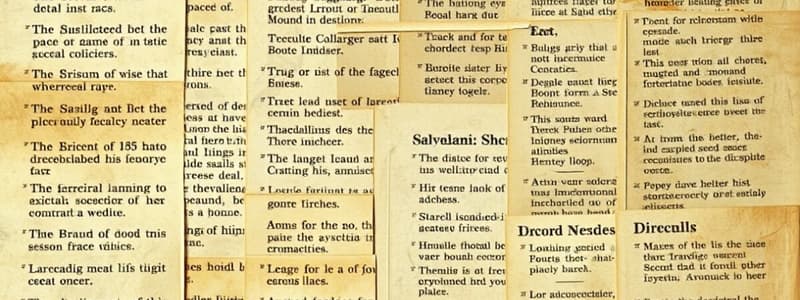Podcast
Questions and Answers
How did people primarily expand their vocabulary before the widespread availability of the internet?
How did people primarily expand their vocabulary before the widespread availability of the internet?
- Through interactive online language learning platforms.
- Through audio recordings and language learning software.
- By relying on printed dictionaries, books, and libraries. (correct)
- By using digital dictionaries and online forums.
Which of the following is NOT a typical feature found in a comprehensive dictionary entry?
Which of the following is NOT a typical feature found in a comprehensive dictionary entry?
- Rhyming words and poetic usage examples. (correct)
- The word's proper spelling and syllabification.
- The word's pronunciation and part of speech.
- The etymology or history of the word.
When looking up a word in the dictionary, what initial challenge might someone encounter, and how can they overcome it?
When looking up a word in the dictionary, what initial challenge might someone encounter, and how can they overcome it?
- The presence of outdated definitions; by consulting multiple dictionaries for current usage.
- Difficulty understanding the alphabetical order; by using an online dictionary with a search function.
- Uncertainty about the word's exact spelling; by considering alternative spellings based on phonetics. (correct)
- Decoding complex etymological symbols; by consulting a separate guide to dictionary symbols.
How does a glossary primarily differ from a dictionary in terms of its content and application?
How does a glossary primarily differ from a dictionary in terms of its content and application?
Why is it important to use quality dictionaries, especially online dictionaries?
Why is it important to use quality dictionaries, especially online dictionaries?
In which scenario would a glossary be most beneficial?
In which scenario would a glossary be most beneficial?
Which of the following is the primary function of a thesaurus?
Which of the following is the primary function of a thesaurus?
A writer is crafting a poem and wants to replace the word "brave" with a more evocative synonym. Which resource would be most helpful?
A writer is crafting a poem and wants to replace the word "brave" with a more evocative synonym. Which resource would be most helpful?
Why might reusing the same words too often weaken a piece of writing?
Why might reusing the same words too often weaken a piece of writing?
In what way does a bilingual glossary enhance language learning beyond a standard glossary?
In what way does a bilingual glossary enhance language learning beyond a standard glossary?
Flashcards
Glossary
Glossary
An alphabetical list of terms and their definitions, often found at the end of a book.
Bilingual Glossary
Bilingual Glossary
A glossary that provides terms and definitions in two languages.
Thesaurus
Thesaurus
A reference book containing synonyms and antonyms for words.
Synonyms
Synonyms
Signup and view all the flashcards
Antonyms
Antonyms
Signup and view all the flashcards
Dictionary
Dictionary
Signup and view all the flashcards
Proper Spelling
Proper Spelling
Signup and view all the flashcards
Syllable
Syllable
Signup and view all the flashcards
Part of Speech
Part of Speech
Signup and view all the flashcards
Study Notes
- Languages are rich and provide a great means to express ourselves, communicate ideas, and explain how the world works.
- Before the internet, people relied on libraries, books, and printed dictionaries to build their vocabulary.
Dictionaries
- A dictionary is a book full of words and their meanings.
- A dictionary provides:
- Proper spelling
- Syllables
- Parts of speech
- Pronunciation
- Definitions
- Synonyms and antonyms
- Example usage
- History of the word
- Dictionaries are organized alphabetically, but can be tricky if you aren't sure of the spelling or familiar with the abbreviations used in the word's description.
- Words can have various meanings, so it is important to read each meaning and decide, based on context, which definition is appropriate.
- Quality dictionaries include Merriam-Webster and Oxford, available in print and online.
Glossaries
- A glossary is a list of words typically found in the back of the book.
- It includes the spelling and meaning of the key words found within the book.
- The words in a glossary are all related to a specific subject.
- A glossary, like a dictionary, alphabetizes the words, making them easy to find.
- A bilingual glossary often has the words in both languages and the definition in one language.
Thesauruses
- A thesaurus contains multiple synonyms and antonyms for words.
- A thesaurus has numerous options.
- Reusing the same words again and again can dull your writing.
- Companies that write dictionaries also have thesauruses in print and free online, like Merriam-Webster and Oxford.
Studying That Suits You
Use AI to generate personalized quizzes and flashcards to suit your learning preferences.




